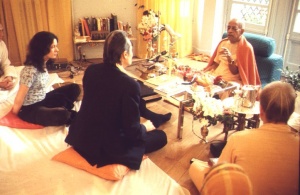CC Adi 17.253 (1975)

A.C. Bhaktivedanta Swami Prabhupada
Below is the 1996 edition text, ready to be substituted with the 1975 one using the compile form.
TEXT 253
- paḍuyā sahasra yāhāṅ paḍe eka-ṭhāñi
- prabhura vṛttānta dvija kahe tāhāṅ yāi
SYNONYMS
paḍuyā—students; sahasra—a thousand; yāhāṅ—where; paḍe—they study; eka-thāñi—in one place; prabhura—of the Lord; vṛttānta—incident; dvija—the brāhmaṇa; kahe—says; tāhāṅ—there; yāi—he goes.
TRANSLATION
The brāhmaṇa student ran to a place where a thousand students were studying together. There he described the incident to them.
PURPORT
In this verse we find the word dvija, indicating that the student was a brāhmaṇa. Actually, in those days, only members of the brāhmaṇa class became students of Vedic literature. Schooling is meant especially for brāhmaṇas; previously there was no question of schooling for kṣatriyas, vaiśyas or śūdras. Kṣatriyas used to learn the technology of warfare, and vaiśyas learned business from their fathers or other businessmen; they were not meant to study the Vedas. At present, however, everyone goes to school, and everyone is given the same type of education, although no one knows what the result will be. The result, however, is most unsatisfactory, as we have seen in the Western countries especially. The United States has vast educational institutions where everyone is allowed to receive an education, but the result is that most students become like hippies.
Higher education is not meant for everyone. Only selected individuals trained in brahminical culture should be allowed to pursue a higher education. Educational institutions should not aim to teach technology, for a technologist cannot properly be called educated. A technologist is a śūdra; only one who studies the Vedas may properly be called a learned man (paṇḍita). The duty of a brāhmaṇa is to become learned in the Vedic literature and teach the Vedic knowledge to other brāhmaṇas. In our Kṛṣṇa consciousness movement we are simply teaching our students to become fit brāhmaṇas and Vaiṣṇavas. In our school at Dallas, the students are learning English and Sanskrit, and through these two languages they are studying all our books, such as Śrīmad-Bhāgavatam, Bhagavad-gītā As It Is and The Nectar of Devotion. It is a mistake to educate every student as a technologist. There must be a group of students who become brāhmaṇas. Without brāhmaṇas who study the Vedic literature, human society will be entirely chaotic.